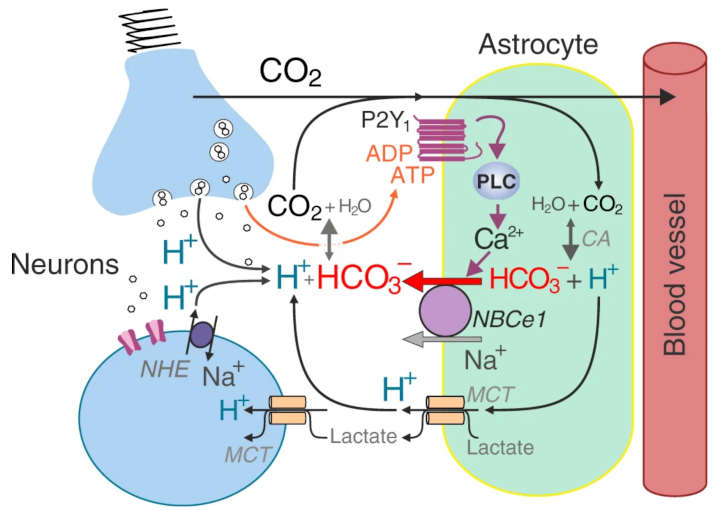Astrocytes play an important role in preventing acidification of the brain, a new study in mice led by University College London researchers reports. The researchers hope their findings1 will help further understanding of several common brain diseases that involve disturbances of pH balance. These include stroke and epilepsy.
The human brain consumes an immense amount of energy, the rate of which is estimated to be equal to human leg muscles running a marathon. Such a high metabolic rate produces a significant amount of acid, but until now, it had not been entirely clear how the brain protects itself from harmful acidification.
We now found that brain glial cells astrocytes play an important housekeeping role in maintaining a healthy pH balance in the brain. We believe it is important, considering that the brain pH can serve as a potential biochemical marker for IQ and there is a strong association of brain acidification with the development of several psychiatric and aging-related brain diseases,
said lead author Dr. Shefeeq Theparambil.
Release Bicarbonate
Astrocytes, shaped like stars, are a type of glial cell, which are non-neuronal cells that make up part of our central nervous system. The researchers suspected that astrocytes may be important to pH regulation, as they can control the movements of alkaline bicarbonate, as well as monitor local brain activity by sensing neuronal signaling molecules.
The researchers studied live mice and brain cell samples to identify the mechanism by which astrocytes maintain pH balance in active areas of the brain. They discovered that more than one third of astrocytes in the mouse brain release bicarbonate that counteracts the acidity of the protons released by neuronal cells.
The bicarbonate release corresponds to local activity levels in the brain, as the mechanism continually responds to changes in brain activity in order to maintain balance and support the activity of nerve cells processing information. The research team also bred a genetically engineered mouse that lacked this astrocyte mechanism, and found that the animals’ brains were no longer capable of maintaining pH balance and the acidity impeded normal brain function.
Acid is produced in the brain in the form of CO2 and the human brain generates an astonishing amount of CO2—more than 75 liters per day. This CO2 can only be removed from the brain by cerebral circulation. Uncontrolled fluctuations in brain CO2 and pH are detrimental to neuronal function and recent evidence suggests that aging and the development of neurodegenerative diseases, like Alzheimer’s, are associated with a progressive reduction in brain pH. Our studies identify astrocytes as the key players in the control of local brain pH and global cerebral blood flow. The identified mechanism may prove to be an effective target in the development of novel treatments of brain disease,
Professor Gourine said. The work was supported by The Wellcome Trust and Fondecyt Iniciación.
- Theparambil, S.M., Hosford, P.S., Ruminot, I. et al.
Astrocytes regulate brain extracellular pH via a neuronal activity-dependent bicarbonate shuttle.
Nat Commun 11, 5073 (2020). ↩︎
Related Posts:
- Astrocytes Linked With Seizures In Brain Tumor Progression
- Omega-3 Fatty Acids Play Critical Role In Blood-brain Barrier
- How Reading A Novel Changes Your Brain
Last Updated on September 15, 2023
